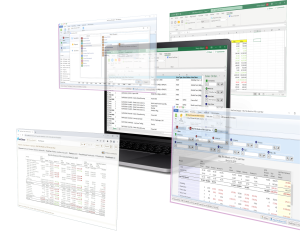Corporate Performance Management
Weak reporting tools often lead businesses to consider duplicating data to other platforms or writing their own SQL queries.
However, these approaches come with integration complexities, data integrity and security risks, additional costs, and require technical expertise.


ERP vendors excel in crafting business processes, but the technology required for that is quite distinct to that required for robust financial reporting.
This is why ERP companies seldom develop effective reporting tools and instead collaborate with, or acquire, specialist suppliers
These, non-native tools usually require dedicated databases. Consequently, the ERP system along with the security and checks you’ve painstakingly set up, are sidestepped, meaning reporting data can be manipulated, potentially breaching double-entry rules.
Configuring and sustaining integration between an ERP system and a reporting database is intricate, requires automated checks, monitoring and the ability to trouble shoot which requires specialised staff. In addition:
With accounting integrity rules sidestepped, data is susceptible to error and inconsistency, impacting business decisions.
ERPs enforce access controls, encryption, and other security measures to shield sensitive information. A separate reporting database has to duplicate all of that, or your data is at risk.
Replicating data to a reporting database creates redundancy and escalates storage costs as well as introducing a risk of data disparity if a transfer should fail.
Separate reporting databases entail additional licensing and infrastructure costs. Is it cost effective?
Great idea!
In this case, ERP vendors may instead steer you towards writing your own SQL:
Now this is powerful, allowing you to extract, manipulate, and analyse data at a granular level, providing insights that might not be readily available through standard ERP interfaces. But sidestepping security is risky.
For this reason, ERP companies often devise a technical tool that protects the database


